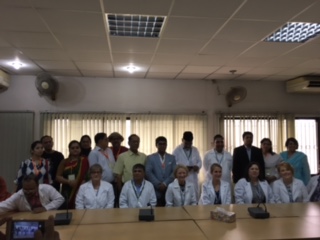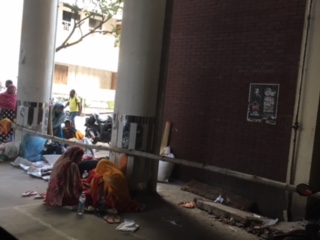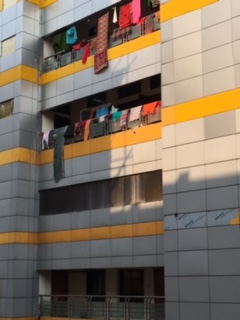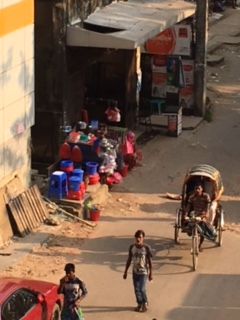Breast Cancer Mission in Bangladesh
NECS President and lead physician Dr. Tracey F. Weisberg is on a medical mission trip to Bangladesh, offering care to breast cancer patients, and medical education to physicians. She will share some of her experiences here.
Day One
I am fortunate to have been accepted to accompany Elizabeth McLellan, CEO and Founder of Partners for World Health to the National institute of Cancer Research (NICRH) and Hospital in Dhaka Bangladesh. We are here for a week to provide medical education to physicians and provide consultations to patients.
The NICRH is the only cancer care facility in the entire country. There are 14 medical oncologists that work tirelessly to serve patients in this country.
Patients are seen by referral from another facility, and frequently have a diagnosis attached to them. In some cases additional testing is required. The medical oncologist by law must see the patient at least once during their cancer treatment. Today there was a line of more than 100 patients waiting for intake to begin the care process.
Once established as a patient, a conference is made and a treatment plan is established. If the patient lives locally, that patient will be treated as an outpatient. Otherwise they are admitted to the hospital for management.
A patient with a radiotherapy treatment plan may wait 4 months to initiate their treatment plan. Most patients receiving IV chemotherapy have a minimal wait if 3 weeks to initiate therapy.
The wards are open wards segregated by sex. Families attend their loved ones personal needs. There is no privacy at all. Everyone sees everyone else's business.
The hospital keeps few records. Patients are required to carry their chart with them and brief notes are entered regarding drugs given and progress. The physicians told us that fewer than 1/3 of patients know what their diagnosis actually is.
There is a differentiation of paying patients and non paying patients. The former has a slightly better accommodation and pays the equivalent of if $3.50 a day for a space in the hospital. Everyone purchases their own drugs and brings them to the hospital. No money, no treatment. A cancer diagnosis on Bangladesh means inevitable pain, suffering and financial stress in a magnitude I pray in America we never endure.
What a wonderful exchange we had with the energetic, compassionate and smart physician team. I look forward to what I can learn from them on this week-long adventure. Their professional challenges are huge. They know the NCCN and ASCO guidelines. They read the same papers we read. Their ability to deliver care is limited by resources.

Partners for World Health Bangladesh Cancer Mission, the head of the Bangladesh Cancer Institute, and host Rotarians The Mavericks.

Patients can wait for days or weeks to be admitted for their chemotherapy or radiation. If they live far away, sometimes the only option is the street. These women are right outside the national cancer institute.

A view of the cancer wards from outside. Patients must bring their own supplies. Family members wash and hang personal items outside.

Outside the hospital, a woman makes her business selling bedpans to patients as they enter.


